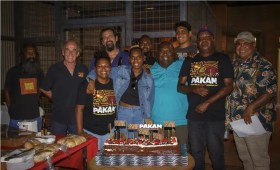‘Write something about what you have learnt, O Wise Guy,’ said our editorial team. ‘You are changing your role and we want to mark the occasion.’
So, here goes.
In 1996, I rode my bicycle down Clarendon Street in South Melbourne to start a job at the Australian Film Commission. I had spent over twenty years as a freelancer, knowing I could pay the next rent cheque but usually not the one after that.
I wondered what on earth I was doing. How could I possibly do this every working day for three years? Then I discovered the pure joy of spending someone else’s money in the service of good, and realised that I had found a place where I was paid to learn. I will never forget the generosity of Tim Read, Michael Ward, Chris Fitchett, Julie Marlow, Fiona Tuomy, Melanie Coombs, Owen Johnston, Jeremy Bean and Kim Dalton over a longer time. And the toughness of Claire Dobbin.
Growing ScreenHub
ScreenHub started around 2003 and I was invited to join in 2005, to discover that I had found my place in the world. Those days seem simple and golden to me now, as we had the time and space to explore ideas in detail, the freedom to take risks, and the corporate luxury of basic wages. We benefitted enormously from CEO Alex Prior’s penetrating mind and commitment to systematic experiment, but the value of our simplicity was slowly eroded by the increasing complexity of both the net and the market.
We were able to bootstrap ScreenHub with simple financing strategies, but we gradually needed outside capital until we became part of Artshub Pty Ltd, to share resources and a site. For me that was the first time I really had the opportunity to be part of a diverse team over long periods of time, for which I will always be grateful. I am a democrat in my bones, but this experience really crystallised the value of diversity.
I discovered how much society changes around us as we age. The past, as they say, is another country and they do things differently there. In my childhood, the culture was obsessed with the recent past and my education was steeped in markers that connected me to deep time. These days, history is not punctuated in the same way, and is shaped by nostalgia and fashion trends. The great turning points were the switch from analog to digital technology, and the rise of the internet, the genesis stories for digital natives.
One casualty of that is humour. We built ScreenHub on playfulness, but we have to accept that our audiences now don’t get a lot of those jokes, or even realise that they are not literal. That’s life.
Basic tendencies
We built on a set of principles which became more and more important as time went on. We came to see that the key actors in the screen world are producers; understand their point of view and everything else makes sense. The fundamental unit of our world is the production company and its interactions with the much smaller set of funders and buyers. Our heroes are the authentic creators in cahoots with the wild pirates who built sophisticated production companies, disproving the despairing mantra that the big factory enterprises dominate the market.
I have been a peripheral part of Generation Zero in the screen sector, which rescued our storytelling tradition from the post-war rictus of servility and made it a way of defining and inhabiting our culture. I sometimes joke that I was the only screen person who never made a dollar out of 10BA, as I went to London and later pottered happily around in education and community level work until the documentary industry was stabilised and I settled into researching and writing, with a small amount of directing.
But I shared a fundamental insight with that ratbag tribe – that everything in our sector was political, and depended on government and could be ruined at a stroke of the pen. That was a burden and a pleasure, because agitating and collective prickliness is fun, but the younger cohorts don’t share that feeling. The sector seems real, stable, made of concrete, just a thing, an entitlement. But they have the same urge to build something new and create opportunities and simply shifted to the internet, which my mob finds difficult to traverse. It is true.
Discussions about baby boomers and subsequent generations are mostly ridiculous. The cliched boomer was a small minority; just as many younger people are greedy reactionaries and their votes create our present; no-one knows what it is like to be their parents. But one thing is true – the children of families that came through the Great Depression and World War 2 were desperate to create safety and opportunity for their kids. We repaid our parents by raising our children to be freer, prouder, more imaginative and more self aware, and that process has continued ever since.
The power of publishing
In most art forms, the journalists are in the business of picking winners and shaping cultures. Some people get anointed, others don’t. Generally speaking, we have avoided that, because we don’t have that arrogance, and the sector is full of unexpected stories about breaking through or declining. The truth is, blind chance and the right advocates make all the difference.
ScreenHub has always been anti-hierarchical, and often insists on exploring work which is far away from the official spotlight. That comes from our commitment to finding those stories and opportunities which are truly pivotal, which tells us where we are going in the future, and how we have to change. Beneath that is our fundamental belief in supporting young people, the next generation who are beginning to live in the now which will one day be the past.
If our sector doesn’t do this, if we don’t continue to evolve paths to education, and share experience, and let go, the accomplishments of this entire sector will be forgotten, will be nothing, until we stumble around in some cultural morass between Washington, Jakarta, London, Beijing, Seoul and Tokyo. Will we become the white trash of Asia?
As writers and audiences we do what we can. The biggest mistake in the screen publishing sector was Screen Australia’s decision to withdraw funding. At the time it did not realise that the internet runs on a special economy which depends on amplification across many sites, and our ability to devote resources to journalism.
In every corner of public life we are now awash in thoughtless, fast motion hype, in which language races out to extremes and loses all capacity to create distinctions or pathways to success.
Journalism in a specialist publication is difficult, because the people we serve have no real need to be in public. They want to read about other people, but don’t want to add to the story. Producers are guarded because hostile stories travel so easily on the internet, while publicists want to protect their marketing schedules and defend projects from lies. I am grateful to those publicists who see themselves as creating dialogue rather than guarding secrets. Ironically, they don’t like being named themselves, but you know who you are.
Journalism for us is the arrowhead on our work. Take it off and all we have is a load of flying sticks. The world is full of them.
Fancypants sayings
I am addicted to aphorisms, as the other Hubbers will tell you. Here is a bunch of them which popped out as I wrote this article, and neatly turned out to number 25:
- The greatest sin in our sector is taking the joy out of the jobs.
2. The greatest sin of the powerful in our sector is to disrespect practitioners.
3. Any work which is not focused on audiences is a waste of time. We are all in the entertainment business. Each craft in the business means something different by the idea of audience, but it all boils down to empathy, not demographics.
4. Most key creative jobs are senior and based on a lot of knowledge. It takes a long time to get there, so the trick is to get on the learning ladder, do a lot of other jobs and make sure you enjoy ourself. Most of your life will be spent getting there, and then gently levered out.
5. If you can possibly avoid being a ‘creative principle’ do it. They are systematically abused in our sector, and subjected to brutal poverty while the grips and production managers and post production supervisors have normal lives with mortgages and families.
6. This sector relies on imagination, change and risktaking to embrace new forms and move with audiences. We shove that task off onto young people, to emerging and aspirational creators, and then deny them resources. Surely that is not a smart approach.
7. All writers are obsessed with pay-offs. That is how you can pick us.
8. The arts rely on wealthy people. Our task is to use the money wisely and teach them to be normal.
9. The screen sector also relies on people who are extremely good at their jobs. There is a huge amount of practical wisdom embedded in the process.
10. All creative positions in the screen sector require leadership, of which there are many, many forms.
11. One of the massive bifurcations of our times came when advertisers worked out how to tell stories on radio and screen media. Once we were open to the world, now we spend our time and energy trying to shut it out.
12. Every moment of every day we are guarding against internet crime. Our tools have become shops and we are never safe.
13. All systems and formulae lead to a greasy ocean of sameness.
14. We often see people determined to continue to promote a particular project or way of working. I’ve come to see that this form of mad, stubborn determination is often a road to nowhere. What matters is that people are absolutely committed to their role, to their vocation, and their capacity for unexpected risk and learning.
15. Learning is about insight and play and experiment, but the heart of learning is about repetition. What we learn has to become a reflex.
16. Education is indoctrination. It is set up to be difficult because that is how people are vulnerable.
17. All ground-breaking ideas have the same life cycle: first they tell you it is impossible, then you get funded by accident, then they say they helped you from the beginning and then they say it was their idea.
18. All screen arts evoke the inner child in the audience. Here we hunger for safety and surrender to those pure emotions we used to have, but we are not cognitively intelligent. Feelings before thoughts.
19. Listen to your enemies. They always have something to teach, even if it is just their weaknesses.
20. Too many people in the screen sector want to have children but don’t have the opportunity.
21. Almost all the noise in the screen sector is created by people who are failing. The trouble with the screen arts is that it takes too long to work out who they are.
22. Nothing endures except principles. Everything else is ephemeral. People, artworks, institutions, buildings, visions, loyalties, culture, species, and the ratio of carbon dioxide to oxygen in the atmosphere. [In 1950 when I was born, it was 300 parts per million. Now it is 420.]
23. This industry embraces diversity but refuses to talk about class. Thereby guaranteeing that our sector will never be democratic, or truly reflect our audience, or be a true meritocracy. And it will always have an edge of pretentiousness.
24. I am stunned by the beauty and potential of the young people I work with.
25. As Reg Mombasa says, Art Irritates Life.





